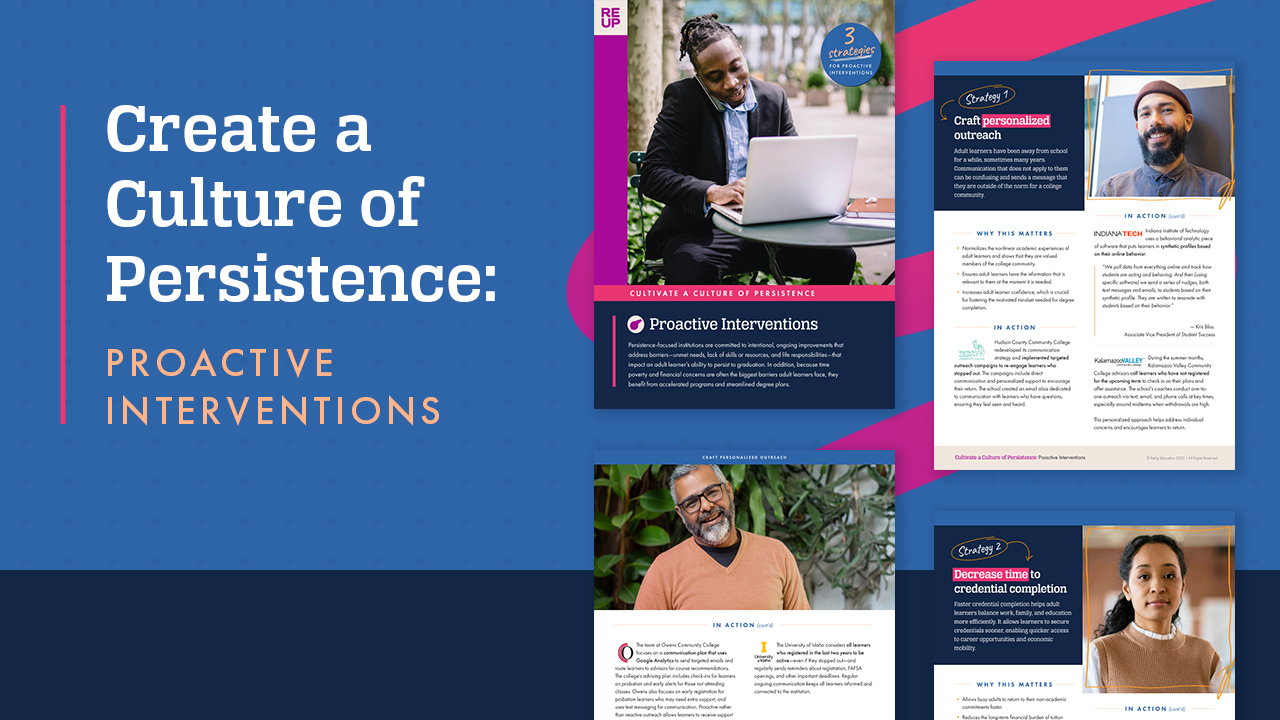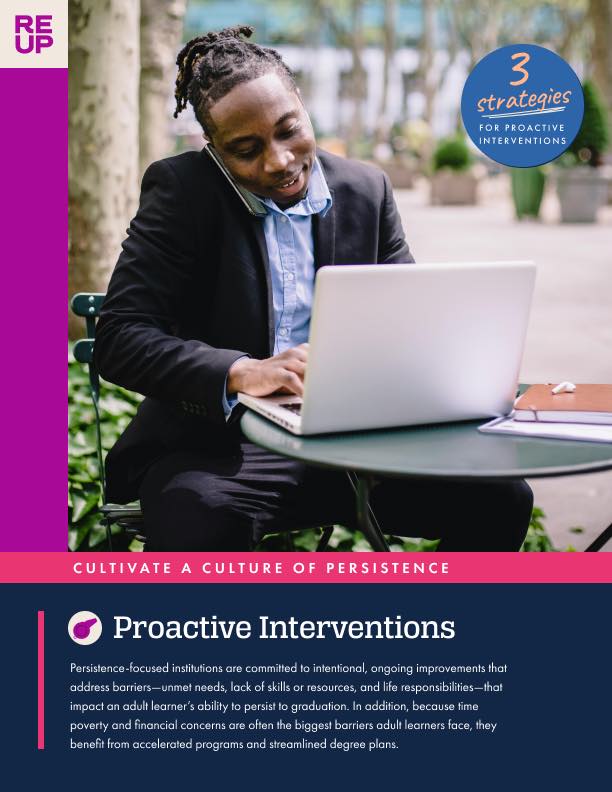Proactive Interventions for Driving Persistence with Adult Learners

Our latest guide offers actionable strategies to enhance engagement, streamline credential completion, and support long-term success.
Over 40 million adults in the United States have earned some college credit but never completed their degree. For higher education institutions, this represents both a challenge and an opportunity. Persistence, the continued enrollment of students from term to term, is a direct indicator of student success and, ultimately, institutional health. Losing these learners impacts not only the individuals themselves but also institutions’ revenue and community engagement.
Adult learners often face unique barriers, including time poverty, financial pressures, and multiple competing responsibilities such as work, parenting, and caregiving. To support these learners effectively, institutions must shift from reacting to challenges to proactively addressing them before they derail progress.
Why start with proactive interventions?
Proactive interventions are a powerful starting point for improving adult learner persistence because they are accessible and impactful, requiring fewer resources than large-scale institutional changes while delivering measurable results. By taking intentional, timely action to address barriers, institutions can build trust, foster confidence, and keep adult learners on track.
Many adult learners put a pause on their education because they feel disconnected, undervalued, or unsupported when navigating the unique challenges they face balancing school with work and family responsibilities. Proactive interventions can counteract these feelings by fostering a culture of care and engagement and set a supportive tone that resonates deeply with adult learners.
Here are three proactive strategies ReUp partner institutions are using to engage their adult learners.
1. Craft Personalized Outreach
Adult learners often feel like they exist on the periphery of the traditional college experience. Nonspecific, generic communication can exacerbate this feeling, pushing them further from re-enrollment. Personalized outreach, however, can create connection and motivation.
- Targeted Campaigns: Use data to segment learners by behavior, status, or other relevant indicators. For instance, sending nudge emails during midterms to encourage continued effort or inviting stopped-out students to re-enroll with a tailored email improves engagement.
- Multi-Channel Communication: Reach learners where they are most comfortable, whether that’s via email, text, or phone calls. Kalamazoo Valley Community College advisors call learners who haven’t registered for the upcoming term, offering personalized assistance.
Download the complete Proactive Interventions guide to access practical tools and insights designed to drive persistence and success.
2. Decrease Time to Credential Completion
Time is one of the most significant barriers adult learners face. The longer the path to graduation, the more likely life’s obstacles will intervene and delay or halt their progress. Addressing this requires reducing unnecessary complexities in the path to a degree.
- Streamlined Degree Plans: Regularly review curriculum requirements for inefficiencies and simplify policies and prerequisites to eliminate unnecessary barriers to progress.
- Earlier Registration Support: Owens Community College provides early course recommendations and sends reminders early in the enrollment cycle. Their data showed that students who registered earlier achieved higher completion rates.
3. Tailor Academic Progression
The diversity of adult learners’ academic backgrounds calls for greater flexibility in how they engage with higher education. Tailored progression pathways recognize learners’ unique starting points, empowering them to stay confident and move forward.:
- Flexible Terms: Shorter course options, like Indiana Tech’s six-week terms, allow learners to balance coursework with external obligations. Advisors help map out plans, incorporating transfer credits or identifying breaks for busy periods.
- Holistic Placement Methods: Owens Community College uses multiple measures—including GPA, past coursework, and self-placement—to ensure learners start at the right level without unnecessary remediation delays.
Make Proactive Support Your First Move
The beauty of proactive interventions lies in their simplicity. You don’t need to overhaul your entire institution to see immediate results. By starting with targeted outreach, streamlined degree pathways, and tailored learning experiences, you can begin making meaningful changes today.
Persistence-focused institutions aren’t just improving student outcomes; they’re building lasting community trust and securing financial sustainability. Remember, every small step toward proactive support can create ripple effects that transform the future for adult learners.
Download the Proactive Interventions guide
If your institution is ready to implement strategic interventions for improving adult learner persistence, we’re here to help. Download our free Proactive Interventions guide for even more insight into the proactive steps institutions are taking to support their adult learners.
- Persistence-focused recommendations
- ReUp Insights
- Checklist of questions to get your team started
Let’s start the conversation
Schedule a call with a ReUp team member to learn more about what a ReUp partnership could do for your institution.
